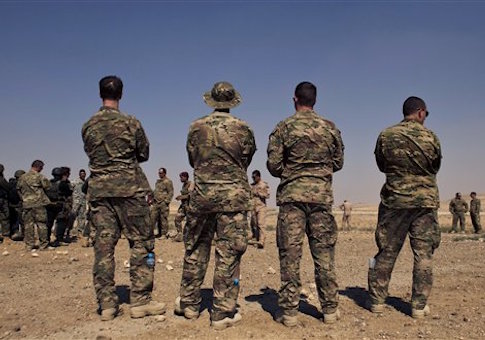The United State is planning to transfer military assets from other parts of the world into Syria to begin coordinating airstrikes with Russia against militants in the war-torn country as part of the newly implemented ceasefire deal, the Associated Press reported Friday.
Senior defense and military officials said they need to pull from different regions to move surveillance aircraft into Syria and increase the number of intelligence analysts to avoid diminishing the current U.S.-led coalition campaign against the Islamic State in Iraq and Syria.
The U.S. will also need additional targeting experts to identify and approve airstrikes against the al Qaeda-linked Jabhat Fatah al Sham, formerly known as the Nusra Front. This provision will prove challenging given that those militants are often intertwined with U.S.-backed rebels.
U.S. military officials have expressed concerns about Russia’s reliance on so-called dumb bombs in Syria that have led to indiscriminate killings of civilians and opposition forces due to their targeting inaccuracies. U.S. troops instead use precision-guided munitions.
The truce brokered by Secretary of State John Kerry and his Russian counterpart Sergey Lavrov is intended to suspend the civil war for a week to reduce violence and allow humanitarian aid deliveries into besieged areas. Once the seven-day ceasefire ends, the U.S. military is set to begin intelligence sharing with Russia on ISIS targets in the region.
Senior Pentagon officials, including Defense Secretary Ash Carter, are largely opposed to the agreement, arguing that Moscow can’t be trusted to honor its provisions. Russian President Vladimir Putin is a key ally to Syrian President Bashar al Assad.
State Department spokesman Mark Toner recognized the cynicism. He also acknowledged concerns from the Defense Department regarding the logistical challenges of setting up a Joint Implementation Center with the Russians that will be used to share targeting data.
"I don’t think that anyone in the U.S. government is necessarily taking at face value Russia’s or certainly not the Syrian regime’s commitment to this arrangement," Toner told the AP. "What really matters here is that the president of the United States supports this agreement, and our system of government works in such a way that everyone follows what the president says."
Still, the ceasefire is proving difficult to hold. Fighting broke out between government forces and opposition rebels in the Syrian capital of Damascus on Friday morning. Activists and residents in the area said the violence in the region marked the heaviest seen in weeks.
Humanitarian access to besieged areas has also remained stalled. The United Nations’ special envoy for Syria, Staffan de Mistura, said Thursday that 40 aid trucks were ready to deliver supplies to the key city of Aleppo but the Assad regime refused to authorize the deliveries. Both government and rebel forces have yet to withdraw from the Castello Road, a point of access needed to reach Aleppo.
The Russian Defense Ministry said it is prepared to extend the ceasefire by an additional 72 hours.
Dmitry Peskov, a Kremlin spokesman, said Moscow was using its influence on the Syrian regime to ensure that government forces abide by the ceasefire. He said the Kremlin expects the U.S. to do the same with rebel forces.
"Beyond all doubt, the Russian side is continuing to use its influence to make sure that the ceasefire accords are implemented and we hope our American colleagues will do the same," Peskov told reporters Friday, according to Reuters.
